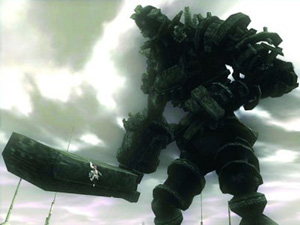Continued from yesterday’s part 1.
__________________________
Jay: Golden Jew, tell us more about your controversial theories on immersion.
Golden Jew: My view is, as with anything, there are many ways to skin a cat, and target a particular gamer… one thing I’ve been frustrated with and responded to before is the lack of good demographic analysis of gamers. And I think that’s because although gaming has been a huge industry for a long while, only when our generation started slamming the work force did it start getting respect and I think now the industry is struggling with ways to better design games and target the right audiences. So we end up with these semi esoteric questions– what is immersion– because designers think that answering that question with a silver bullet will mean big bucks and nothing, in any industry, (except for the fact sex sells) is that clear cut.
 |
|
Does an amazing graphical style make a game more immersive? |
Christian: Seems lots of people have discussed what immersion means to them. For me, something like FF10 isn’t immersive. I’m watching a passive story, and thinking about numbers and sphere grids. Doom 3 isn’t immersive, because as good as it looks, it behaves like a Disney ride. Immersion is about fighting a Colossi, and when I’m done, I realize that I’m holding R1 down too hard because subconsciously I thought that if I didn’t, my hero would lose his grip. It’s about hl2 for me, where I literally feel like freeman. It’s about Homeworld, where that fleet is mine, and I get a lump in my throat when I send out a squad. To me, immersion is when you forget you’re playing a game there are no keyboards or pads, no TV screen. Your entire mind focuses on the moment in the game.
Horatio: Well, I think Golden Jew makes a good point about immersion and its come out here which is that there are multiple types of immersion maybe and they’re important in different ways to different demographics. Let’s call what I’ve been mostly ranting about ‘tolerance’ immersion. That is immersion that makes you buy into a game and I think that’s most important to the casual gamer because it makes you want to play. A universe, nice graphics, etc. etc. keeps you coming back for more. then there’s like another level which is the sort of ‘lose yourself’ immersion, which isn’t as necessary, and is cool for more hard core people which is more what Stefan was talking about I think. But like Jay is saying, if you just really like moving shit on grids, you don’t really need that either. A last type we haven’t really talked about is say ‘real life’ immersion like the Wii, which is turning remote controls into swinging and I just want to briefly mention it because its important to the next generation and I think risky. It’s fun because you have more mechanics at your disposal. It’s not fun because I play sports video games because I suck at sports so turning games back into sports would be fucking dumb.
Jay: Yes, I agree with the sports thing completely. If I were coordinated I’d be outside.
Horatio: So I guess my point is that it’s hard to pin this down and how important it is and depends on how you define it. But that I think in general it’s most important to attracting more casual gamers.
 |
|
Jeff waves his hands around, as if to say, “I’m Jeff Hawkins the computer guy, not Steven Hawking the wheelchair guy.” |
Stefan: I think I can offer a definition that might work. If you start with the Hawkins memory-prediction framework, then immersion can be modeled as the extent to which a game allows the player to build up a “world” or network of predictions. Which are then fulfilled. When predictions or expectations come true, the player feels like things are right, and also feels a bit clever. When something is expected and does not happen, then either a good explanation is required which makes the event fit into the worldview that was established…Or else a jarring sense of wrong takes hold, and immersion is damaged. Depending on how extensive a network of predictions is supported, you either end up with a deeply immersive “lose yourself” type of game, or a mildly immersive “Mario” type of game.
Horatio: That seems like a sound definition, but not very complete. Doesn’t that make Tetris just as immersive as World of Warcraft?
Stefan: Tetris only allows for a few expectations, and those not very complicated.
Horatio: Oh, so the more expectations you can fulfill the more immersive?
Stefan: Whereas WoW draws on our pre-existing concepts of how people live, form societies, and interact. Which allows us to accept it more, when they are fulfilled.
Jay: But I’d argue the stylized graphics of Ico add to the immersion even though I’m not sure what expectations I’d be able to build from them.


[…] Horatio – Allows Jay, Ryo Hazuki, simulation, Sonic, Utah Post navigation Review – Killer 7Lame Discussion: Immersion – Part 2 Subscribe Login Notify of new follow-up comments new replies to my […]